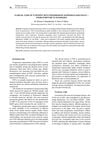 1 citations,
January 2005 in “Side effects of drugs annual”
1 citations,
January 2005 in “Side effects of drugs annual” The document concluded that various dermatological treatments have different effectiveness and side effects, with some causing irritation, allergic reactions, or systemic effects.
 May 2024 in “International journal of nanomedicine”
May 2024 in “International journal of nanomedicine” Plant-derived extracellular vesicles show promise for treating diseases like cancer and inflammation.
 April 2024 in “Cell death and disease”
April 2024 in “Cell death and disease” Long COVID causes various long-term health issues and needs better awareness and treatment.
 April 2024 in “Research Square (Research Square)”
April 2024 in “Research Square (Research Square)” MSC-protein helps regenerate gum tissue and bone.

Ayurvedic herbs may reduce side effects and improve effectiveness of cancer treatments.
 January 2024 in “Theranostics”
January 2024 in “Theranostics” HDAC6 helps keep ovarian follicles dormant, extending female fertility.

Henna has many medicinal uses but needs more research to confirm its benefits.
 December 2023 in “bioRxiv (Cold Spring Harbor Laboratory)”
December 2023 in “bioRxiv (Cold Spring Harbor Laboratory)” Different types of inactive melanocyte stem cells exist with unique characteristics and potential to develop into other cells.
 December 2023 in “bioRxiv (Cold Spring Harbor Laboratory)”
December 2023 in “bioRxiv (Cold Spring Harbor Laboratory)” AP-2α and AP-2β proteins are essential for healthy adult skin and hair.
 November 2023 in “Klìtinna ta organna transplantologìâ”
November 2023 in “Klìtinna ta organna transplantologìâ” MSC-derived exosomes can help treat COVID-19, hair loss, skin aging, and arthritis.
 October 2023 in “Journal of Medicine, University of Santo Tomas (JMUST Online)”
October 2023 in “Journal of Medicine, University of Santo Tomas (JMUST Online)” Elderly patients frequently suffer from skin conditions, especially inflammatory ones, highlighting the need for better healthcare.
 October 2023 in “Biomedical science and engineering”
October 2023 in “Biomedical science and engineering” Innovative methods are reducing animal testing and improving biomedical research.
 September 2023 in “Asian journal of beauty & cosmetology”
September 2023 in “Asian journal of beauty & cosmetology” Lipids are important for healthy hair, but their exact role is not fully understood and needs more research.
 September 2023 in “Nature communications”
September 2023 in “Nature communications” Alk1 in specific cells is crucial for proper nerve branching and hair function.
 June 2023 in “Revista médica hondureña”
June 2023 in “Revista médica hondureña” Most pediatric cancer patients in the study developed skin problems, often due to their cancer treatment.

A 12-year-old girl was misdiagnosed with alopecia areata but actually had a nevus sebaceus with a genetic mutation.
 April 2023 in “Tikrit journal of pharmaceutical sciences”
April 2023 in “Tikrit journal of pharmaceutical sciences” Most people in Tikrit, Iraq, have used herbal medicine, mainly for hair, skin, and digestive issues, hoping for effective treatments.
 December 2022 in “Medical lasers”
December 2022 in “Medical lasers” Low-level laser therapy may help with hair regrowth in alopecia areata but its effectiveness for psoriasis and atopic dermatitis needs more research.
 December 2022 in “Biological and Clinical Sciences Research Journal”
December 2022 in “Biological and Clinical Sciences Research Journal” Early treatment of mixed connective tissue disease is crucial to prevent severe autoimmune conditions.
 November 2022 in “CARDIOMETRY”
November 2022 in “CARDIOMETRY” A group has developed therapies that show promise for treating cancer and various other conditions.
 October 2022 in “Rheumatology (Bulgaria)”
October 2022 in “Rheumatology (Bulgaria)” Accurate diagnosis of progressive supranuclear palsy requires thorough neurological assessments and MRI.
 December 2021 in “Turkderm”
December 2021 in “Turkderm” The COVID-19 pandemic led to fewer dermatology patients, more stress-related skin conditions during the crisis, and a rise in contact dermatitis after, with ongoing concerns for public health and treatment delays.
 January 2021 in “Erciyes medical journal”
January 2021 in “Erciyes medical journal” The COVID-19 pandemic changed the types of skin conditions seen at a clinic, with fewer patients and varying numbers of specific conditions.
 January 2021 in “Clinical dermatology open access journal”
January 2021 in “Clinical dermatology open access journal” Dermatologists in Western Rajasthan often prescribe doxepin for elderly patients with skin and mental health issues.
 December 2020 in “Current Sexual Health Reports”
December 2020 in “Current Sexual Health Reports” Finasteride can have lasting negative effects on brain function and behavior by disrupting neurosteroid production.
 September 2020 in “Journal of the turkish academy of dermatology”
September 2020 in “Journal of the turkish academy of dermatology” Some dermatology patients in Turkey use traditional medicine, with herbal remedies being most common, but these treatments can have mixed results and risks.
 June 2020 in “bioRxiv (Cold Spring Harbor Laboratory)”
June 2020 in “bioRxiv (Cold Spring Harbor Laboratory)” Activating β-catenin increases melanocytes and decreases Schwann cells.
 January 2020 in “Current trends in diagnosis & treatment”
January 2020 in “Current trends in diagnosis & treatment” The review suggests doctors should carefully weigh risks and benefits of off-label drug use, involve patients in decisions, and calls for better regulations and monitoring.
 January 2020 in “Asian Journal of Basic Science & Research”
January 2020 in “Asian Journal of Basic Science & Research” Nutrease powder, a high-protein, low-carb supplement, can help manage Polycystic Ovary Syndrome symptoms, regulate periods, improve ovulation, and restore fertility.

PlacMA hydrogels from human placenta are versatile and useful for cell culture and tissue engineering.






























